While looking at the belisarius's question about generation of non-singular integer matrices with uniform distribution of its elements, I was studying a paper by Dana Randal, "Efficient generation of random non-singular matrices". The algorithm proposed is recursive, and involves generating a matrix of lower dimension and assigning it to a given minor. I used combinations of Insert and Transpose to do it, but there are must be more efficient ways of doing it. How would you do it?
The following is the code:
Clear[Gen];
Gen[p_, 1] := {{{1}}, RandomInteger[{1, p - 1}, {1, 1}]};
Gen[p_, n_] := Module[{v, r, aa, tt, afr, am, tm},
While[True,
v = RandomInteger[{0, p - 1}, n];
r = LengthWhile[v, # == 0 &] + 1;
If[r <= n, Break[]]
];
afr = UnitVector[n, r];
{am, tm} = Gen[p, n - 1];
{Insert[
Transpose[
Insert[Transpose[am], RandomInteger[{0, p - 1}, n - 1], r]], afr,
1], Insert[
Transpose[Insert[Transpose[tm], ConstantArray[0, n - 1], r]], v,
r]}
]
NonSingularRandomMatrix[p_?PrimeQ, n_] := Mod[Dot @@ Gen[p, n], p]
It does generate a non-singular matrix, and has uniform distribution of matrix elements, but requires p to be prime:

The code is also not every efficient, which is, I suspect due to my inefficient matrix constructors:
In[10]:= Timing[NonSingularRandomMatrix[101, 300];]
Out[10]= {0.421, Null}
EDIT So let me condense my question. The minor matrix of a given matrix
m can be computed as follows:
MinorMatrix[m_?MatrixQ, {i_, j_}] :=
Drop[Transpose[Drop[Transpose[m], {j}]], {i}]
It is the original matrix with i-th row and j-th column deleted.
I now need to create a matrix of size n by n that will have the given minor matrix mm at position {i,j}. What I used in the algorithm was:
ExpandMinor[minmat_, {i_, j_}, v1_,
v2_] /; {Length[v1] - 1, Length[v2]} == Dimensions[minmat] :=
Insert[Transpose[Insert[Transpose[minmat], v2, j]], v1, i]
Example:
In[31]:= ExpandMinor[
IdentityMatrix[4], {2, 3}, {1, 2, 3, 4, 5}, {2, 3, 4, 4}]
Out[31]= {{1, 0, 2, 0, 0}, {1, 2, 3, 4, 5}, {0, 1, 3, 0, 0}, {0, 0, 4,
1, 0}, {0, 0, 4, 0, 1}}
I am hoping this can be done more efficiently, which is what I am soliciting in the question.
Per blisarius's suggestion I looked into implementing ExpandMinor via ArrayFlatten.
Clear[ExpandMinorAlt];
ExpandMinorAlt[m_, {i_ /; i > 1, j_}, v1_,
v2_] /; {Length[v1] - 1, Length[v2]} == Dimensions[m] :=
ArrayFlatten[{
{Part[m, ;; i - 1, ;; j - 1], Transpose@{v2[[;; i - 1]]},
Part[m, ;; i - 1, j ;;]},
{{v1[[;; j - 1]]}, {{v1[[j]]}}, {v1[[j + 1 ;;]]}},
{Part[m, i ;;, ;; j - 1], Transpose@{v2[[i ;;]]}, Part[m, i ;;, j ;;]}
}]
ExpandMinorAlt[m_, {1, j_}, v1_,
v2_] /; {Length[v1] - 1, Length[v2]} == Dimensions[m] :=
ArrayFlatten[{
{{v1[[;; j - 1]]}, {{v1[[j]]}}, {v1[[j + 1 ;;]]}},
{Part[m, All, ;; j - 1], Transpose@{v2}, Part[m, All, j ;;]}
}]
In[192]:= dim = 5;
mm = RandomInteger[{-5, 5}, {dim, dim}];
v1 = RandomInteger[{-5, 5}, dim + 1];
v2 = RandomInteger[{-5, 5}, dim];
In[196]:=
Table[ExpandMinor[mm, {i, j}, v1, v2] ==
ExpandMinorAlt[mm, {i, j}, v1, v2], {i, dim}, {j, dim}] //
Flatten // DeleteDuplicates
Out[196]= {True}